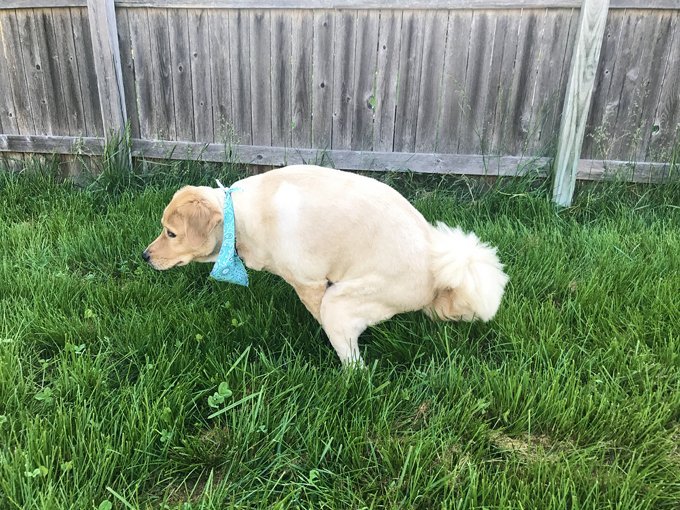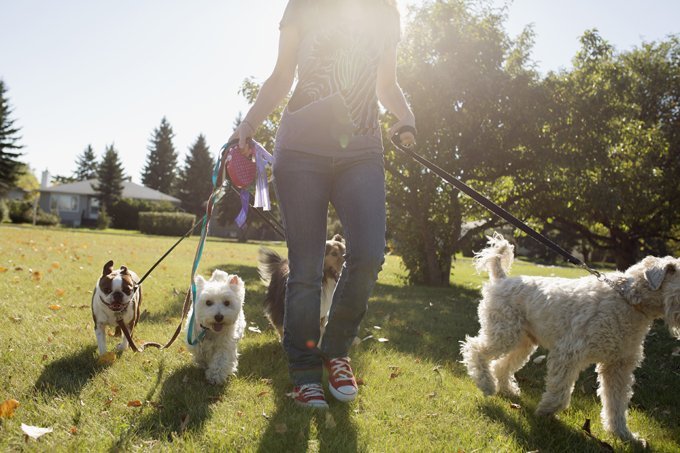All dogs go, and all that poop has got to go somewhere. A significant amount of dog waste is ending up in our streams and rivers after being abandoned on lawns, parks and sidewalks, and the poops that do get bagged in plastic are destined for the landfill. So what is a pet parent to do? Let’s take a look at how we can be good guardians to our pets — and the planet — at home and on the go.
In The House
(Picture Credit: Getty Images)Hopefully your dog goes outdoors, but young pups and small, sick or special needs dogs will often take their bathroom breaks indoors on a pee pad. They are convenient and sometimes necessary, but disposable doggy pee pads will drain your wallet while adding to humanity’s solid waste problem.
As a disposable hygiene product, your pup’s plastic pee pads are destined to join baby diapers, incontinence underwear and sanitary napkins in the back of the garbage truck and, ultimately, the landfill. Although biodegradable pee pads are available, even they likely won’t break down in their final destination. According to the Environment and Plastics Industry Council, most municipal landfills aren’t managed in a way that promotes decomposition. They’re more like garbage tombs than biological reactors.
If the thought of your dog’s soiled pad lingering in a landfill doesn’t sit well with your green conscience, consider instead reusable, cloth pee-pads or a dog potty system that incorporates real or artificial grass.
In The Backyard

If your pets have mastered doing their business outside, it’s important to pick up poops as soon as they are dropped to prevent your yard from polluting the local watershed.
Of course, once you’ve scooped your pet’s poop you still have to do something with it. Many municipalities have rules about how — and how much — pet waste can be included with household garbage, as pet poop significantly contributes to greenhouse gas emissions when sent to the landfill.
To keep pet waste out of the dump, consider composting your dog’s droppings if your municipality allows it. Pet waste composters need to be separate from regular compost and obviously can’t be used on vegetable gardens, but the resulting fertilizer can be used on ornamental plants, according to the David Suzuki Foundation.
If your city or homeowners association has rules against pet waste composting, professional dog poop removal services are popping up in many cities and are eager to relieve you of your dog’s droppings by hauling them to a sewage treatment facility for a fee.
On A Walk

Our dogs love to poop when we’re out and about, but there has got to be a better solution than trapping the waste in a plastic bag, and then dropping that in another plastic bag.
Eco-friendly dog waste bags are popular among pooch walkers, but according to the Federal Trade Commission, they don’t breakdown in landfills — and that’s where that garbage can at your local park is going to end up.
If you’d rather not add to the landfill, use a reusable poop bag (retail or DIY) to bring droppings home with you. Once home, you can add your pup’s poop to your compost or bring it into the bathroom and send it to the sewer (perhaps in the same flush as your own waste to save water).
While some cities (including Rockville, Maryland, Metro Vancouver and Ottawa) encourage pet parents to flush dog poop in this fashion, municipalities definitely don’t want you to flush the bags — unless you want a major plumbing nightmare.
The Scoop On Greening Pet Poop
Whether you’re dealing with backyard dumps or a sidewalk surprise, it’s totally possible to green-up your poop clean-up. Check with your city’s public works department to see if your town has any programs for pet waste, and if the local water treatment system welcomes dog poop flushes.
Taking care of the planet while taking care of our animals might require a change in our routines, but reducing our pets’ environmental impact is a gift to all animals — not just those in our homes.




